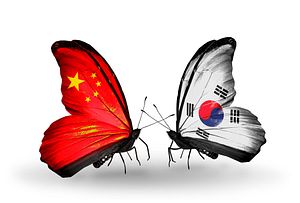There has been much debate recently on the possibility of a China-South Korea alliance. The “pro” arguments quite often begin by noting that China has been emerging rapidly in a multi-polar world, making a strategic competition or even stand-off between China and the United States more probable. Hence, China may need to reconsider its long-existing principle of “nonalignment” and think about allying with certain countries to mitigate pressures from the United States and its own traditional allies. As a potential ally, South Korea naturally draws people’s attention, since both China and South Korea share a number of common interests: combating a perceived threat from Japan, dealing with the North Korean nuclear threat, and maintaining regional peace in East Asia.
The China-Republic of Korea (ROK) relationship is enjoying its best period in history. The state visit by Chinese President Xi Jinping in July 2014 further solidified the diplomatic foundation between these two neighbors at the strategic level. Meanwhile, statistics in economic cooperation and people-to-people interactions reveal the increasingly close ties between Beijing and Seoul. China-ROK trade is worth $229 billion, larger than the combined value of U.S.-ROK and Japan-ROK trade. In terms of people-to-people interactions, the number of flights between the two countries provides a good example. There are more than 830 flights between China and South Korea every week, and in a single day there are 30 flights between Qingdao in China and South Korean airports.
Despite growing interactions, the question remains: Is there really enough trust and agreement between China and South Korea to feasibly start building an alliance? This is not to question the necessity of genuine friendship and mutual trust between these two countries; rather, I want to place China and South Korea’s perceptions of each other (and of their positions in the region) in a broader framework.
To answer the question posed above, we have to step outside the bilateral framework of the China-ROK relationship and examine both countries from a regional perspective. In fact, for both China and South Korea, a certain level of tacit coordination on specific issues at both strategic and tactical levels would be much more feasible and (more importantly) more controllable than starting a new alliance. There are several factors that hinder the construction of a China-ROK alliance.
First, vigilance from the United States and Japan would attempt to prevent the alliance. China faces a strong U.S.-Japan alliance — and will probably face an even stronger U.S.-Japan alliance in the near future. Closer ties between Beijing and Seoul would put both the United States and Japan on significant alert. What’s more, for South Korea, the 60-year alliance relationship with the United States probably means more than two decades of diplomatic relations with China. Given the current situation, could China really undermine the foundation of the ROK-U.S. alliance and, even further, replace it with a China-ROK version?
Second, China must think about reactions by the DPRK. Even though the Chinese government has described the relationship between China and the DPRK as a normal relationship between states, the international community believes that Beijing-Pyongyang communication is still strong, although it may not carry as much weight as it once did. Nevertheless, it doesn’t matter whether China and the DPRK are formal allies or not; neither wants to give up or seriously endanger their unique relationship, which was sealed in blood during the Korean War. 22 years ago, the DPRK felt abandoned when China decided to normalize its diplomatic relationship with South Korea. Would a newly emerged China-ROK alliance push the DPRK into the arms of Japan or even the United States? China may have to be even more vigilant given the recent thaw between Tokyo and Pyongyang.
Third, China and the ROK have an uncertain foundation for an alliance. The most direct and of course the most effective foundation for an alliance is a common threat. China and South Korea may find some common ground when it comes to the threat from Japan, but even here these two countries have different long-term strategic goals. China views Japan as a long-term competitor in East Asia, while South Korea needs Japan (and the United States of course) to help to realize its hedging strategy toward China.
Fourth, there’s the potential alliance dilemma, which has become so well-known as to almost be a cliché. Simply put, alliances come with problems, issues, and dilemmas. If there is an alliance, there will be a bundle of new responsibilities and obligations, and quite often there will be difficult situations with difficult choices. Further, different countries have different interests, and there are many differences in the interests of great powers like China and middle powers like South Korea. Additionally, the two countries have very different political and ideological systems. When two allies vary in their perceptions of the severity or significance of common threats, the alliance is held tightly together not only through the common threats and common interests, but also thanks to “soft” elements like shared institutions, norms, rules, and even beliefs. As far as these “soft” factors are concerned, both China and South Korea are still far apart. Currently, the debate on whether there should be a China-ROK alliance seems to be more or less a choice between pragmatism on one hand and principles on the other.
Given the current situation, China needs to be delicate and avoid making South Korea believe that it has to renounce pressure of any kind (including pressure to form an alliance) from China. Instead, China should welcome a more self-reliant South Korea. In other words, China’s diplomacy to South Korea should focus on convincing South Koreans believe that they can benefit from close ties with China, rather than making them feel forced to accept whatever China offers.

































